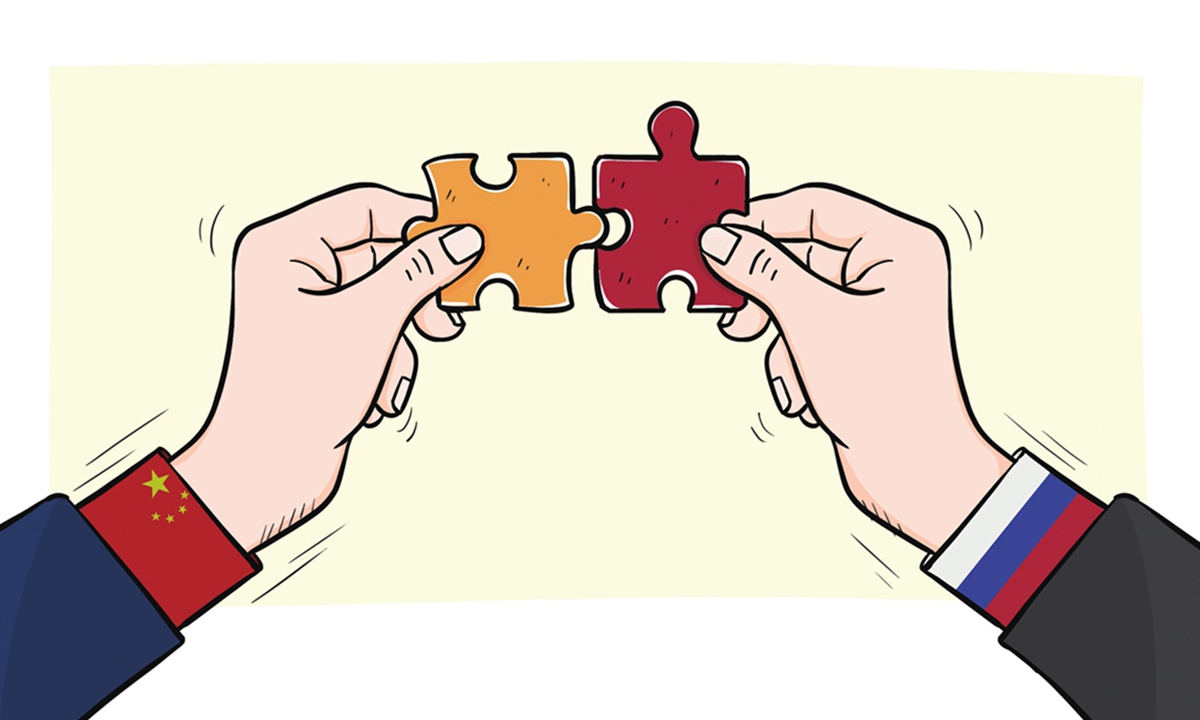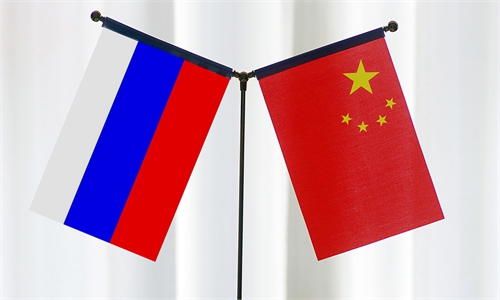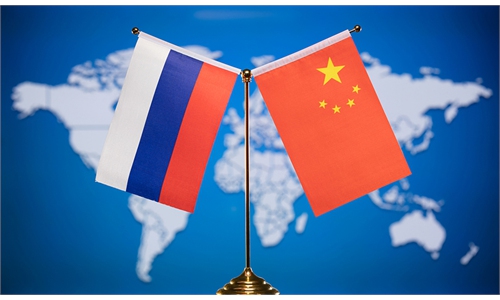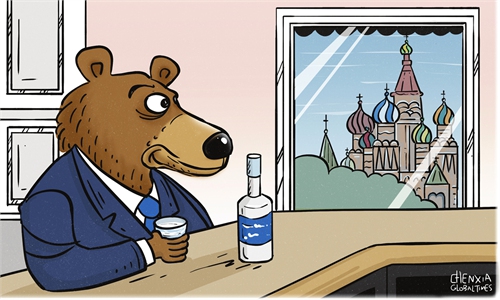
China, Russia. Illustration: Chen Xia/GT
Russian foreign policy expert, Valdai Club Program Director Timofei Bordachev wrote earlier this month that "the conflict - which is in fact a hybrid war - between Russia and the US and Europe, can be seen as a condition that will make the 'turn to the East' no longer an option but a necessity, thus force the Russian state to take it seriously."He continues in the piece, "This is, in fact, a rather new situation and subject for discussion for Russia, since it has never before in its history had to address the issue of the dependence of internal stability on interaction with various external partners. To what extent this is true, we have yet to figure out. But even now, one can make several assumptions that are directly related to what place relations with Asia will occupy for Russia in the coming years." Then he goes on to explain these assumptions.
Bordachev does not simply say that Russia should become an Asian power and abandon relations, for example, in the Middle East or some places in Europe. But his discussion is interesting, because it is quite familiar to that of the Washington foreign policy blob.
For example, I was immediately reminded of an essay by former assistant secretary of state for European and Eurasian affairs A. Wess Mitchell for The National Interest based on his report for the Pentagon Office of Net Assessment in 2020. In it, he postulated a comprehensive strategy to box Russia out of Europe and force it into Asia, competing with China and staggering a potential conflict with both powers.
This could solve America's deep "simultaneity problem." This problem is, fundamentally, that the US could not possibly win a two-front war with Russia and China at the same time. That means that Washington would need to pick one off first, or significantly weaken one, to avoid this eventuality. Within the context of the ongoing conflict in Ukraine that Russia entered in February, increased support for Kiev by the North Atlantic Treaty Organization (NATO) and the current setbacks Russia has faced, it is hard to not see this situation as exactly what Mitchell described.
The conflict in Ukraine and Russia's now near-pariah status in Europe could be the thing that helps Washington stagger its two-front competition and, even more in America's favor, force a natural competition between Moscow and Beijing as they compete in shared formats and markets. But is there any indication that this could really happen?
With trade balance between Moscow and Beijing approaching $200 billion, this deepening dependence - and, especially if Russia became a beneficiary of Chinese technology - could be hyped up as Russia becoming a side-car to Chinese geopolitical ambitions by many Western observers. That would be an unacceptable situation for Russian conservatives and nationalists who insist that Russia is a distinct civilization.
But for the broader Russian and Chinese elites, noticeably, China and Russia are not in an outright military alliance but have a strategic partnership aimed at creating a more equitable global order. Should Moscow initiate competition with Beijing, this would shift the global geostrategic calculus so much as to undermine both parties' shared goals. Both countries understand that if they became aggressive toward each other (like the former USSR was with China) the strategic imbalance in the world would be too great.
The Russia-China strategic partnership is so extraordinarily important as to be, in my view, the defining relationship in geopolitics. In fact, the founder of modern geopolitics, Sir Halford John Mackinder argued in 1904 when presenting his landmark paper "The Geographical Pivot of History" that the British Empire's focus at that time on naval power would be rendered meaningless with sufficient development of land transport that could integrate Eurasia, what he called the "World-Island."
For Mackinder, whoever controls the "World-Island" - that is, Eurasia - controls history. Washington today faces the same problem as the former British Empire, with a powerful navy and a foothold on the periphery of the World-Island - but no control over the heartland, where China and Russia reign supreme. The Sino-Soviet split in the 20th century helped ensure that the Eastern bloc never spanned the World-Island but today's Russia-China strategic partnership and the China-led Belt and Road Initiative (BRI) represent Mackinder's exact strategy.
If this were not reason enough, and I believe that it's important to note, as Bordachev hinted at, that Russia is welcome to turn to the entire Global South - not just Asia - for economic opportunities in the future. The growth potential in South-South cooperation is so lucrative in the coming era that I believe Beijing and Moscow don't even have to compete for markets, but can instead pool their talent and resources to both benefits immensely. There is big enough room for the two to cooperate.
The author is a Prague-based American journalist, columnist and political commentator. opinion@globaltimes.com.cn




